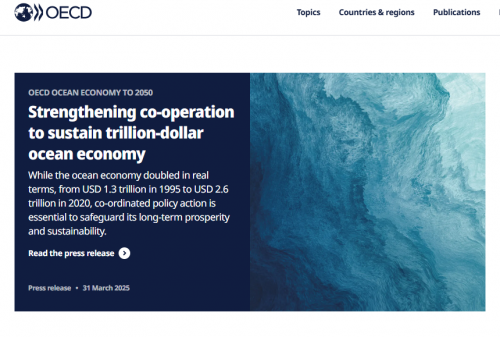While the ocean economy doubled in real terms, from USD 1.3 trillion in 1995 to USD 2.6 trillion in 2020, co-ordinated policy action is essential to safeguard its long-term prosperity and sustainability, a new OECD report finds. The OECD Ocean Economy to 2050 identifies key priorities for policymakers to secure a resilient and sustainable future ocean economy, balancing economic opportunity with environmental responsibility.
Over the past 25 years, the ocean economy – driven by offshore oil and gas, marine and coastal tourism, marine fishing and aquaculture, maritime transport and port activities – contributed between 3% and 4% of global gross value added and grew steadily with no substantial contractions. But various forces – including climate change, demographic shifts, trade disruptions, and insufficient investments in productivity and green energy – could slow or even reverse growth. In a future scenario where investment in productivity is not forthcoming and the energy transition stalls, global ocean economic activity could decline by around 20% below 2020 levels by mid-century. In contrast, an accelerated shift to cleaner energy combined with technological innovation could support continued ocean economy growth, albeit more modestly than past performance.
“Improving ocean policies and international co-operation is an economic imperative,” OECD Secretary General Mathias Cormann said. “Through science-based policy, improved management of marine spaces, and innovative digital solutions, we can protect the jobs, livelihoods, and food security of hundreds of millions of people who depend on the ocean.”
The policy frameworks and mechanisms governing the ocean and the ocean economy have been strengthened over the past decade at the national and international level – including through national ocean strategies, maritime spatial planning, ocean economy statistical accounts, and international negotiations on biodiversity, climate, fisheries, and shipping decarbonisation. But addressing a range of critical issues, such as market concentration and illicit activities, will require increased attention from policymakers.
Key policy recommendations from the report include strengthening policy action and collaboration to enhance ocean management, accelerating the energy transition away from fossil fuels, and adopting advanced digital technologies and data collection systems. In addition, the report calls for deeper co-operation with developing countries on the ocean economy, maximising the benefits of ocean economic activity to livelihoods and wellbeing, and promoting the conservation, sustainable use and restoration of fragile marine ecosystems.
The analysis is based on new OECD calculations drawn from detailed tables underpinning the Inter-Country Input-Output (ICIO) database. These insights provide a comprehensive overview of the ocean economy’s contribution to global prosperity. Forward-looking scenarios to 2050 are built on historical productivity trends to assess potential ocean economic growth scenarios to 2050.
Media queries should be directed to Elisabeth Schoeffmann in the OECD Media Office (+33 1 45 24 97 00).
Working with over 100 countries, the OECD is a global policy forum that promotes policies to preserve individual liberty and improve the economic and social well-being of people around the world.










